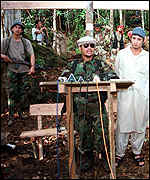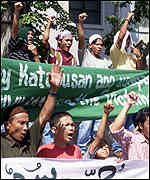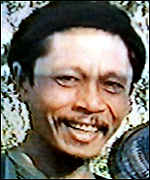May 2, 2000, BBC Online News, Who are the Abu Sayyaf hostage-takers?,
from web site
May 2, 2000, BBC Online News, Who are the Abu Sayyaf hostage-takers?,
Tuesday, 10:49 GMT 11:49 UK
The militant Islamic group Abu Sayyaf is one of several guerrilla organisations involved in a recent resurgence of violence in the Philippines.
The group is operating in the south of the country, where other militants have been warring for almost 30 years for an Islamic state, independent of the mainly Christian Philippines.
Abu Sayyaf—or Father of the swordsman in Arabic—was named after a mujahedin fighter in Afghanistan in the 1980s, where a number of its members fought against the Soviet-backed regime.
Previously a faction within the Moro National Liberation Front (MNLF), it split off in 1991 to pursue a more fundamentalist battle against the Philippine authorities.
Tuesday, 10:49 GMT 11:49 UK
The militant Islamic group Abu Sayyaf is one of several guerrilla organisations involved in a recent resurgence of violence in the Philippines.
The group is operating in the south of the country, where other militants have been warring for almost 30 years for an Islamic state, independent of the mainly Christian Philippines.
Abu Sayyaf—or Father of the swordsman in Arabic—was named after a mujahedin fighter in Afghanistan in the 1980s, where a number of its members fought against the Soviet-backed regime.
Previously a faction within the Moro National Liberation Front (MNLF), it split off in 1991 to pursue a more fundamentalist battle against the Philippine authorities.
Religious war

Abu Sayyaf rebels give a jungle press conference

Abu Sayyaf rebels give a jungle press conference
Hostage-taking is the latest in a series of actions which began in the early 1990s with a spate of bombings, assassinations and kidnappings of priests and businessmen.
In December 1994, the group bombed a Philippines Airlines plane on a flight from Manila to Tokyo, killing one passenger.

Muslims protest in Manila - but some Moros have taken a more violent path
An attack on the town of Ipil in 1995 left 50 people dead, and a grenade attack on a department store in Zamboanga in 1998 injured 60.
Analysts say such attacks show the group—which is believed to have a core membership of around 200—is trying to spark a religious war.
The Philippines Government says Abu Sayyaf has been trying to evict Christians from its Basilan Island base.
As well as suspecting links with the mastermind behind the US World Trade Centre bombing, Ramzi Youssef, Manila believes it is connected to the man who tops America's most-wanted list, Osama Bin Laden.
Analysts say that Abu Sayyaf has received arms and munitions from Afghanistan.
In December 1994, the group bombed a Philippines Airlines plane on a flight from Manila to Tokyo, killing one passenger.

Muslims protest in Manila - but some Moros have taken a more violent path
An attack on the town of Ipil in 1995 left 50 people dead, and a grenade attack on a department store in Zamboanga in 1998 injured 60.
Analysts say such attacks show the group—which is believed to have a core membership of around 200—is trying to spark a religious war.
The Philippines Government says Abu Sayyaf has been trying to evict Christians from its Basilan Island base.
As well as suspecting links with the mastermind behind the US World Trade Centre bombing, Ramzi Youssef, Manila believes it is connected to the man who tops America's most-wanted list, Osama Bin Laden.
Analysts say that Abu Sayyaf has received arms and munitions from Afghanistan.
Leaders

Commander Robot: In charge of the hostage-takers

Commander Robot: In charge of the hostage-takers
The founder of Abu Sayyaf—Abdurajak Abubakar Janjalani—was an Islamic scholar.
He was killed in a clash with the Philippine Army in December 1998.
The group responsible for the latest hostage-taking appears to be led by Galib Andang, also known as Commander Robot.
He has been allegedly involved in earlier kidnappings.
He was killed in a clash with the Philippine Army in December 1998.
The group responsible for the latest hostage-taking appears to be led by Galib Andang, also known as Commander Robot.
He has been allegedly involved in earlier kidnappings.
Moderates
The Moros, who converted to Islam in the 14th century, have long resisted the Philippines' Catholic rulers, dating back to the Spanish colonial period.
The current violence dates back to 1972, when then President Ferdinand Marcos imposed martial law.
Abu Sayyaf is the most militant of the anti-Manila groups and wants an independent Islamic state in Mindanao—an impoverished region with an annual income a mere fifth of the national Philippines average.
Moderates are calling simply for the implementation of a planned 13-province autonomous region in the southern Philippines.
The MNLF—from which Abu Sayyaf split—announced a ceasefire in 1996, and is pursuing talks with government officials.
A third group—the Moro Islamic Liberation Front, which numbers around 15,000 fighters—had also been on ceasefire, but has now halted all dialogue with the government after military assaults on its camps.

christian louboutin sale
puma outlet
uggs outlet
nike shoes
yeezy boost
yeezy boost 350 v2
ralph lauren sale
michael kors outlet clearance
giuseppe zanotti shoes
lunette ray ban
cheap nfl jerseys
canada goose outlet
michael kors outlet
pandora outlet
coach outlet store
michael kors outlet
polo ralph lauren
michael kors outlet
ugg outlet stores
clarks outlet
valentino shoes
canada goose outlet store
canada goose
canada goose outlet
polo ralph lauren factory store
canada goose
ferragamo outlet store
longchamp handbags
canada goose uk
michael kors outlet online
uggs outlet online
ralph lauren
coach outlet online
canada goose jackets
oakley sunglasses
true religion
ugg outlet
canada goose outlet
oakley sunglasses
ralph lauren outlet
polo ralph lauren
coach factory outlet
michael kors outlet online
michael kors handbags sale
uggs outlet
cheap ugg boots
ugg outlet online
adidas shoes for men
polo ralph lauren
cheap mlb jerseys
canada goose jackets
ugg boots
michael kors outlet
canada goose outlet
ralph lauren
adidas outlet online
uggs outlet
oakley sunglasses wholesale
pandora charms
uggs outlet
coach outlet
polo ralph lauren outlet
canada goose outlet online
polo outlet
ugg outlet
coach outlet online
michael kors outlet
polo ralph lauren
michael kors outlet online
pandora outlet
cheap oakley sunglasses
nike outlet online
valentino outlet
michael kors handbags
coach outlet
oakley sunglasses
kate spade outlet store
canada goose jackets
canada goose jackets
kate spade handbags
polo ralph lauren outlet
coach outlet
canada goose jackets
christian louboutin sale
canada goose jackets
prada outlet store
true religion outlet
moncler jackets
ray ban sunglasses
cheap ugg boots
coach factory outlet
coach outlet online
ed hardy
canada goose jackets
oakley sunglasses
tory burch outlet online
mont blanc
canada goose jackets
cheap ray ban sunglasses
cheap uggs
ugg outlet online
polo ralph lauren outlet online
coach outlet online
fitflops clearance
canada goose outlet
ugg boots
ugg outlet
oakley sunglasses
nhl jerseys
cheap oakley sunglasses
polo ralph lauren
michael kors outlet clearance
oakley sunglasses outlet
kate spade outlet
true religion outlet store
fred perry polo
coach outlet online
cheap oakley sunglasses
pandora bracelet
canada goose
ralph lauren uk
canada goose
polo ralph lauren
polo ralph lauren
canada goose
uggs outlet
ray ban sunglasses
ugg outlet
michael kors outlet
nike shoes for men
cheap authentic nba jerseys
canada goose outlet
ugg outlet
fred perry polo shirts
canada goose outlet stores
ugg outlet
adidas yeezy boost
moncler outlet
ferragamo shoes
cheap ugg boots
cheap oakley sunglasses
michael kors outlet online
cheap uggs
fred perry
canada goose jackets sale
nfl jerseys
ralph lauren shirts
ugg outlet
polo outlet
oakley sunglasses
oakley sunglasses wholesale
clarks shoes
ugg outlet
michael kors outlet store
polo outlet stores
michael kors outlet online
longchamp outlet
fitflop sale
ray ban sunglasses
canada goose outlet
tory burch handbags
ferragamo shoes sale
uggs outlet
michael kors outlet online
canada goose outlet store
michael kors outlet
uggs outlet
ralph lauren shirts
michael kors outlet clearance
vintage nhl jerseys
cheap jordans
cheap ugg boots
michael kors outlet online
michael kors outlet clearance
canada goose outlet
polo outlet
nike air max 90
uggs on sale
ugg boots
michael kors outlet store
pandora charms
asics outlet
nike shoes
polo outlet
nike factory store
cheap ugg boots
kate spade outlet
canada goose outlet store
michael kors outlet online
mulberry handbags
polo ralph lauren outlet
canada goose jackets
ugg outlet
cheap nba jersey
ugg boots for women
coach outlet online
kate spade handbags
canada goose jackets
cheap ugg boots
coach outlet store online
asics running shoes
canada goose outlet
christian louboutin sale
ugg outlet
polo outlet
adidas superstar
michael kors outlet clearance
pandora charms
canada goose outlet
canada goose outlet store
kate spade outlet online
coach factory outlet
polo ralph lauren
michael kors handbags
nike trainers
kate spade bags
uggs outlet online
canada goose uk
cheap jordan shoes
canada goose
canada goose
cheap jordans for sale
nike air max
ray ban sunglasses outlet
michael kors outlet clearance
cheap ray bans sunglasses
nike outlet store
canada goose
michael kors outlet online
ralph lauren
michael kors outlet
pandora jewelry
moncler outlet
ralph lauren uk
uggs outlet
nike shoes
fitflops sale
canada goose outlet online
lacoste shoes
ugg outlet store
ugg outlet stores
christian louboutin uk
coach outlet online coach factory outlet
canada goose outlet store
cheap uggs
moncler outlet
canada goose jackets
cheap ugg boots
longchamp handbags
polo ralph lauren
adidas nmd r1
christian louboutin
true religion outlet online
oakley sunglasses wholesale
mont blanc outlet
ugg outlet
true religion jeans sale
coach outlet store online
polo ralph lauren outlet
true religion outlet store
ugg outlet
nmd adidas
coach outlet
ugg outlet
polo ralph lauren shirts
canada goose outlet online
canada goose
mlb jerseys wholesale
canada goose outlet
uggs outlet
ray ban sunglasses for men
cheap mlb jerseys
mont blanc
tory burch outlet stores
michael kors handbags
ralph lauren outlet
canada goose jackets
valentino shoes
cheap jordan shoes
ralph lauren outlet
nike outlet store
coach outlet
kate spade outlet store
mcm bag
polo ralph lauren sale
nike outlet
michael kors outlet
fred perry polo shirts
ralph lauren uk
coach outlet store online
canada goose jackets
pandora bracelet
uggs outlet
cheap ray ban sunglasses
oakley sunglasses wholesale
polo outlet
cheap ugg boots
canada goose
mulberry handbags
adidas yeezy shoes
canada goose outlet
hermes belts outlet
moncler outlet online
uggs outlet
cheap ugg boots
prada outlet online
pandora bracelet
canada goose outlet online
michael kors outlet
cheap jordans
adidas yeezy boost
canada goose outlet
canada goose jackets
ralph lauren
ralph lauren sale clearance
mont blanc pens
cheap jordans for sale
ugg boots
yeezy boost
uggs on sale
uggs outlet
michael kors
nike shoes
ugg outlet store
fitflops sale clearance
canada goose
michael kors outlet
kate spade outlet online store
ugg outlet store
canada goose outlet
ralph lauren outlet
coach outlet
cheap uggs
michael kors outlet online
uggs outlet
lacoste polo
cheap nhl jerseys
cheap uggs
coach factory outlet
polo ralph lauren
christian louboutin outlet
michael kors outlet
lebron james shoes
michael kors outlet
canada goose outlet
michael kors outlet online
fred perry polo
cheap nfl jerseys
coach factory outlet
mbt shoes clearance outlet
giuseppe zanotti outlet
yeezy shoes
christian louboutin shoes
ugg outlet store
uggs outlet
uggs outlet
michael kors outlet
puma shoes
christian louboutin shoes
coach outlet online
michael kors outlet
coach outlet online
air max 2017
michael kors outlet online
nike outlet store
mont blanc outlet
canada goose outlet
michael kors outlet clearance
ugg boots outlet
nike outlet store
lebron shoes
michael kors outlet
ugg outlet
christian louboutin outlet
canada goose outlet
michael kors outlet store
oakley sunglasses for men
cheap nfl jerseys
michael kors outlet clearance
hermes outlet
canada goose jackets
uggs outlet
pandora outlet
ralph lauren outlet
adidas yeezy shoes
coach factory outlet
coach outlet online
polo outlet
fitflops outlet
cheap jordans
ugg boots
coach outlet store online
coach outlet online
mont blanc outlet
ray ban sunglasses
canada goose outlet
canada goose uk
ugg boots on sale
canada goose outlet online
yeezy boost 350
canada goose jackets sale
mlb jerseys
cheap snapbacks
valentino outlet
canada goose
true religion outlet
mulberry outlet
mont blanc pens for sale
ugg outlet store
cheap jordan shoes
pandora jewelry outlet
ralph lauren uk
canada goose outlet
air jordan 4
coach outlet
coach factory outlet
ralph lauren
ray bans sunglasses outlet
canada goose outlet
adidas yeezy
michael kors outlet
polo ralph lauren
canada goose jackets
coach outlet
canada goose outlet store
nfl jerseys
michael kors outlet online
adidas nmd r1
pandora outlet online
nike outlet online
michael kors outlet
coach outlet
michael kors outlet online
pandora jewelry
cheap nike shoes
polo ralph lauren outlet online
coach outlet store online
kate spade outlet
ralph lauren outlet
canada goose
ugg sale
polo ralph lauren outlet
pandora rings
prada outlet stores
michael kors outlet
lacoste shirts
michael kors outlet
ralph lauren uk
air jordan shoes
coach factory outlet
cheap uggs
fred perry clothing
polo outlet
ugg boots outlet
michael kors outlet online
fred perry polo
kate spade purses
canada goose outlet online
ugg outlet online
canada goose jackets
nike shoes outlet
valentino outlet store
ugg boots
ugg sale
cheap oakley sunglasses
uggs outlet
canada goose jackets
polo ralph lauren
polo shirts
pandora jewelry
nike shoes outlet
cheap ugg boots
coach outlet online
polo ralph lauren outlet
ugg outlet store
coach outlet store online
longchamp
pandora outlet
pandora charms
uggs canada
uggs outlet
uggs canada
michael kors outlet
kate spade handbags
tory burch outlet
pandora rings
hermes birkin
air jordan retro
mcm outlet
ray ban sunglasses
canada goose outlet
pandora charms sale clearance
coach outlet online
canada goose outlet
pandora charms
ugg canada
polo shirts
michael kors outlet
uggs outlet
canada goose outlet
ugg outlet
coach outlet
pandora rings
polo outlet
polo ralph lauren
coach outlet online
mulberry bags
ralph lauren uk
mulberry outlet
coach outlet canada
ugg outlet
mbt shoes
nike outlet store
michael kors outlet online
polo ralph lauren outlet online
air jordan 4 retro
kate spade outlet
ray ban sunglasses outlet
fred perry outlet
michael kors outlet stores
nike shoes on sale
cheap ugg boots
coach outlet
ray ban pas cher
coach factory outlet
coach factory outlet
canada goose jackets
canada goose parka
ht
yeezy boost 350
pandora charms
toms outlet
ray ban sunglasses outlet
kate spade handbags
coach outlet canada
cheap jordan shoes
ralph lauren outlet online
moncler outlet online
pandora charms
valentino
cheap ugg boots
birkenstock shoes
polo ralph lauren outlet
canada goose jackets
coach outlet online
kate spade outlet online
ugg shoes
nike air max 2018
adidas nmd r1
michael kors outlet store
ralph lauren outlet online
fitflops sale clearance
coach outlet canada
moncler jackets
moncler outlet online
moncler jackets
coach factory outlet online
hermes bag
ralph lauren sale
cheap jerseys
longchamp bags
michael kors bags
coach outlet online
canada goose jackets
nike outlet store
ugg outlet online
ugg outlet
coach factory outlet online
mulberry
polo ralph lauren outlet
coach outlet online
nike outlet store online
bottes ugg
nike huarache shoes
uggs
adidas store
ugg outlet online
birkin handbags
uggs on sale
burberry uk
timberland outlet store
michael kors outlet store
discount oakley sunglasses
pandora charms outlet
ralph lauren outlet
ralph lauren outlet online
ray ban sunglasses discount
toms
canada goose coats
north face jackets
coach factory outlet
burberry outlet
pandora charms sale clearance
ugg boots outlet
burberry outlet online
canada goose outlet
pandora charms sale clearance
adidas ultra boost
pandora jewelry outlet
ralph lauren sale
nfl jerseys cheap
louis vuitton outlet store
birkenstock outlet store
cheap jordan shoes
coach factory outlet
ray ban sunglasses outlet
coach outlet online
adidas nmd runner
christian louboutin sale
ugg canada
michael kors outlet online
polo ralph lauren outlet
ralph lauren uk
gucci outlet online
ugg boots
michael kors uk
canada goose outlet
mlb jerseys
yeezy shoes
cheap ray ban sunglasses
fitflop sandals
ralph lauren outlet
coach outlet online
pandora charms sale clearance
birkenstock uk
adidas yeezy boost 350
cheap nfl jerseys wholesale
adidas outlet online
coach outlet online
adidas yeezy shoes
coach factory outlet online
louboutin shoes
ralph lauren uk
yeezy boost
cheap ugg sale
discount oakley sunglasses
coach outlet online
nfl jerseys
red bottom heels
coach handbags outlet
longchamps
ugg outlet
canada goose sale
nfl jerseys wholesale
ralph lauren
pandora charms
polo ralph lauren outlet
uggs outlet
ugg sale
ralph lauren outlet